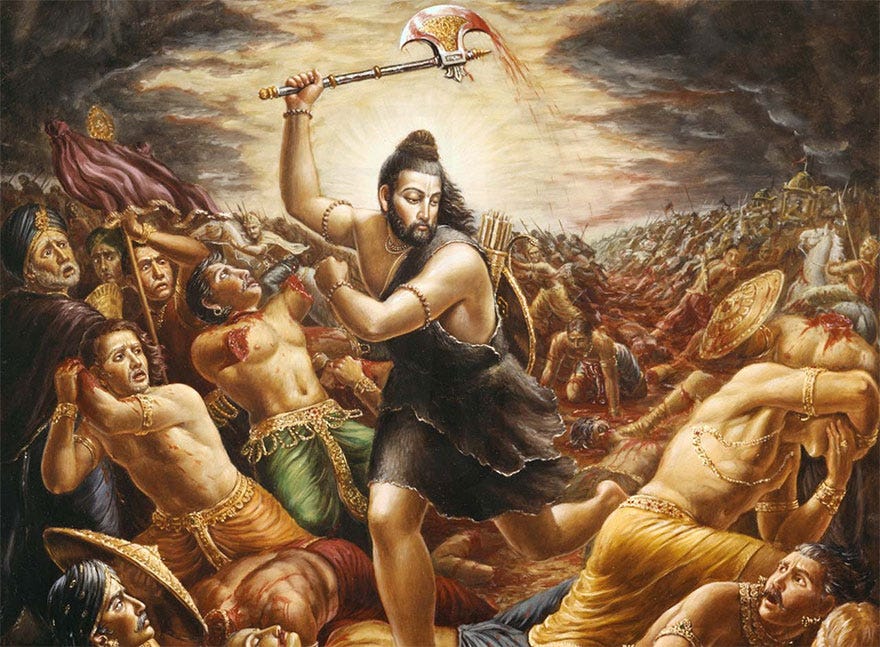M114 - Succession Crisis in Hastinapur
After Amba left Hasthinapura in pursuit of vengeance against Bhishma, back in the palace The marriage between Vichitravirya and the other two girls Ambika and Ambalika was performed.Vichitravirya lived a happy life in the company of his two wives for seven years. After this period, he was inflicted by a disease and he soon died. Satyavati was plunged into grief not only by the death of her two sons but also by the fact that the Kuru race was left with no heir, the only surviving prince Bhishma having renounced his right to become a king and Bahlika, elder brother of Santhanu unwilling to leave Bahlika Kingdom, thus there was a succession crisis in Hastinapur.
Ambika and Ambalika were also greatly overwhelmed at the untimely death of their husband. Upon realizing a kingdom without a King would not prosper and the possible extinction of the dynasty, Satyavati approached Bhishma requesting him, The perpetuation of the Kuru dynasty now depends on you. The wives of your brother, Ambalika and Ambika, desire progeny, and under my order you should procreate children by them to continue this dynasty. You should duly marry a wife of good character and enthrone yourself as king. Do not plunge our ancestors into hell. Upon hearing Satyavati's request, the relatives and friends of the Kuru family agreed. However, Bhishma replied to his stepmother, O mother, what you have said is certainly sanctioned according to the code of virtue, but you forget my vow regarding marriage and children. I have taken a vow of lifelong celibacy. I may have to renounce kingship of the three worlds, the kingdom of heaven, and anything greater that exists, but this vow I will never renounce.
Hearing Bhishma's determination, Satyavati replied, I know the vow that you have taken is on my account, but considering the present emergency you should accept this order as duty to the ancestors. Bhishma again emphasized his duty to truth, O Queen, do not sway from the path of virtue. Renunciation of a vow is never acclaimed.

Bhishma cited a few incidents from history to apprise her of what the right course was in situations similar to that. He first cited the story of Parasurama, the son of Sage Jamadagni, who, angered by the death of his father at the hands of the three sons of King of Haihaya, killed the king and subsequently wiped out the entire Kshatriya race twenty-one times.
Ambika and Ambalika were also greatly overwhelmed at the untimely death of their husband. Upon realizing a kingdom without a King would not prosper and the possible extinction of the dynasty, Satyavati approached Bhishma requesting him, The perpetuation of the Kuru dynasty now depends on you. The wives of your brother, Ambalika and Ambika, desire progeny, and under my order you should procreate children by them to continue this dynasty. You should duly marry a wife of good character and enthrone yourself as king. Do not plunge our ancestors into hell. Upon hearing Satyavati's request, the relatives and friends of the Kuru family agreed. However, Bhishma replied to his stepmother, O mother, what you have said is certainly sanctioned according to the code of virtue, but you forget my vow regarding marriage and children. I have taken a vow of lifelong celibacy. I may have to renounce kingship of the three worlds, the kingdom of heaven, and anything greater that exists, but this vow I will never renounce.
Hearing Bhishma's determination, Satyavati replied, I know the vow that you have taken is on my account, but considering the present emergency you should accept this order as duty to the ancestors. Bhishma again emphasized his duty to truth, O Queen, do not sway from the path of virtue. Renunciation of a vow is never acclaimed.

Bhishma cited a few incidents from history to apprise her of what the right course was in situations similar to that. He first cited the story of Parasurama, the son of Sage Jamadagni, who, angered by the death of his father at the hands of the three sons of King of Haihaya, killed the king and subsequently wiped out the entire Kshatriya race twenty-one times.
Bhishma cited another historical event involving Sage Dirghatamas. Dirghatamas, at the request of King Vali raised five illustrious sons through Vali’s wife Sudeshana. These sons were considered the sons of Vali. Bhishma suggested a course of action in these lines. He said that an accomplished Brahmin be invited to raise offspring on the wives of Vichitravirya.Bhishma cited another historical event involving Sage Dirghatamas. Dirghatamas, at the request of King Vali raised five illustrious sons through Vali’s wife Sudeshana. These sons were considered the sons of Vali. Bhishma suggested a course of action in these lines. He said that an accomplished Brahmin be invited to raise offspring on the wives of Vichitravirya.
The widows of the Kshatriya kings, not out of lust, but out of a desire to keep their race alive, had offspring raised by Brahmins. As per the Vedas (the scriptures), a son so raised belonged not to the Brahmin, the child’s biological father, but to the Kshatriya who had married the child’s mother.
Hearing Bhishma’s words, Satyavati told about her past encounter with sage Parasara and the birth of sage Vyasa to Bhishma. As Vyasa said his mother, "when you are in difficulty simply remember me, and I will come to you by the speed of the mind." Satyavathi asked Bhishma If he is willing to call him. Upon hearing the name of Vyasa, Bhishma joined his palms in reverence saying, This sage has true wisdom and sense control, and would be a fit person to continue the Kuru dynasty. Therefore, you have my full approval.

Comments
Post a Comment